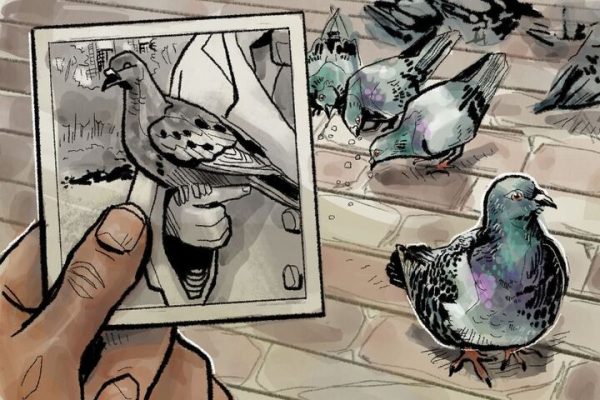OPINION: International travel during the pandemic is not for the faint of heart
“Luggage is rarely lost but sometimes it doesn’t make the same plane you do,” Columnist Audrey Korte writes. “Depending on your destination that may mean spending a few days waiting for it to arrive.”
The project went well.
The travel did not.
I just returned from Sierra Leone in West Africa on the Mandela Washington Fellowship Reciprocal Exchange through the U.S. Department of State (DOS) where I hosted the Women’s Communication & Leadership Conference.
Over the course of 20 days, I had seven COVID tests, spent about $1,000 on re-bookings and COVID testing, suffered 104 hours of delays, spent 12 hours talking to customer service agents, lost my luggage, was asked what country Africa was in and was briefly locked in a stairwell after getting stuck in an airport basement.
I arrived back in Wichita around midnight Monday, Dec. 6 after 15 days abroad. I faced quite a travel fiasco both leaving and returning from my trip.
To Africa and beyond
I was supposed to arrive in Freetown, Sierra Leone on the night of Nov. 17. I landed around 8 p.m. on Nov. 21.
One of the problems in traveling to a small developing country is that only so many flights come and go from there. Missing a leg of your journey causes significant delays.
When departing Wichita I needed a negative COVID test within 72 hours of the first flight. Since I left on Tuesday, I was tested on Monday. The results weren’t back in time for me to make that flight unfortunately.
Re-Booking Nightmares
After hours on the phone with customer service and travel agents I got everything re-booked. I’d leave Wednesday instead of Monday now.
That morning, about an hour before departing for the airport I got a call from United Airlines (UA). My plane needed maintenance, they said, so they’d put me on an American Airlines flight to ensure I caught the remaining flights needed to get to Sierra Leone. Sounded good to me.
That change from United to American for the first leg of the trip did something wonky to my reservation though. The computer system didn’t recognize the booking anymore. Suddenly I couldn’t access my reservation to submit the forms required for a boarding pass. I still can’t believe how complicated resolving the issue was. A few hours later I sat dumbstruck while my flight took off. I’d been on the phone and computer with 5 people all that time trying to solve the problem.
I spent an additional four hours trying to get re-booked on a flight that landed anytime before Sunday night. The error was not on me and I was relentless. They tried to convince me to get on a plane that evening to Chicago that would keep me in that airport for over 30 hours all before boarding the 2nd of five flights. I didn’t give in. They finally scheduled me on a flight to Paris with Delta Airlines more than 13 hours after I’d been called about my plane needing maintenance.
Another unexpected gauntlet was getting to the airport. A series of issues with taxis, Ubers and friends who couldn’t drive me to the airport left me arriving at the airport the following morning just 38 minutes before takeoff. Nobody was in line. I thought I got lucky.
They wouldn’t let me on the plane — I needed to be there more than an hour ahead of flying, they said.
I begged. I pleaded. They refused.
I spent three hours re-booking for 5 a.m. the next day. I was worried about repeating the debacle with rides so I spent the night in the airport.
The next morning, I flew from Wichita to Houston, Chicago, Brussels and Dakar before finally landing in Sierra Leone the following night.
I arrived but my luggage did not. It was crowded, unorganized, loud, and hot. I got two COVID tests in the airport. A van, a car and a boat trip later I arrived in Freetown proper and took a hired car to my Airbnb.
Finally, Freetown
The place I was staying lacked reliable internet and running water and at times I went days without electricity. But I wanted to be in a real neighborhood and get to know the locals. That’s the reporter in me so I take responsibility for getting duped by the owner.
I was communicating with the Department of State through a friend’s email — mine wasn’t working. I explained that we couldn’t complete our project on time. Our conference was scheduled for Nov. 25 and the funds were supposed to be used by Nov. 30. DOS finally agreed to allow me to stay until Dec. 5 and we rescheduled everything.

Was it worth it?
The trip wasn’t all bad. I met amazing people, ate well and saw things I never imagined.
Thankfully, our conference was a resounding success and local television and radio news worked with us to ensure it was covered properly. It was awesome to make news in another country.
Our work with women was inspiring. I think it made an impact. And we gained much important support and attention for this work during my visit. I hope to continue training women as professional communicators and leaders in Sierra Leone in the future.
Though there are things I’d do differently, I don’t regret going.
All too soon, I needed to prepare for the return home. The end of last week I was informed that the U.S. COVID testing stipulations for travelers were changing on Monday Dec. 6 and I may need to get tested within 24 hours of my 9 p.m. flight home on Sunday.
I needed to have the test Sunday as I was entering the U.S. on Monday. But I didn’t know that at the time so I spent Friday trying to get the test I’d prepaid $70 USD for. Seven hours of calls to the Sierra Leonean government yielded nothing but conflicting information. On my ninth call, they sent me to a military hospital. I arrived just before 5 p.m. and convinced the exhausted doctor to administer the test. He said results would be in Sunday afternoon.
Nothing happens on time in Sierra Leone and there’s nothing you can do about it. Luckily, a friend who is an Army doctor there spent Saturday ensuring I got the results before I left. Those results got me out of Freetown and to Dakar, Senegal and onto Brussels, Belgium.
Many Americans on the flight were worried. We’d hoped that because the first leg of the flight left Sunday we might be alright on Monday when arriving in the U.S. That was not the case.
Brussels nearly broke me
En route to Brussels, someone told me I could get a rapid test in the Brussels airport. I looked it up the minute I landed. According to the airport website, there’s a test center for arrivals and another for departures. I needed the center for those arriving as the other was outside the airport and I didn’t have a VISA to leave. After walking for 40 minutes, I arrived around 7:30 a.m. local time. Though tests were supposedly available after 6 a.m., nobody was there.
I asked anyone I could find what to do. A worker said she thought testing was downstairs and put me in an elevator going down two levels. The doors opened but there were restricted signs everywhere. I hit the button to go back upstairs but needed a keycard to ride up. I was stuck in a freezing cold area with deafening machine sounds.
My phone did not work.
I got out of the elevator, calling out for help. There was nobody. I saw a door with an image of stairs on it. I opened the door and went into the staircase even though it was pitch black. I thought there may be motion sensor lights so I moved around waving my arms — nothing happened. I tried to leave the stairwell but the door was locked.
I pulled my flashlight from my backpack and said a prayer. I walked up a flight — the door was locked again. I went up another flight and the door was locked but not latched. I made it out into the airport proper again and found myself right back where I had started three and a half hours earlier.
Time to start again, I thought, I headed back to where my plane had landed. After 30 minutes retracing my steps, going the wrong way down rising escalators and in out doors, I was back where I’d first been processed. Security didn’t know what to do with me.
After much explanation, a security agent took pity on me. He brought me through the baggage search area and security — all going backwards. He explained to agents and staff that he had to get this “poor American woman” to the departures terminal so she could leave the airport for a COVID test. He convinced them and brought me to a door giving me instructions on what to do next. I stepped through the door into the departures area and then outside into the freezing winter. I was wearing a thin sweatshirt, jeans and flip flops. There was ice on the ground and it was drizzling rain.
I arrived at the testing center a couple of hours before my flight, worried about how long the process would take. It was relatively quick and after paying 55 Euros I was tested promptly. Results arrived 30 minutes later.
I proceeded through the long security lines with my prized test results in hand and got to the gate 26 minutes before takeoff.
Nine hours later at Dulles airport in Washington D.C. nobody checked the test results.
You never know when your trip abroad will become more of an adventure than you bargained for. Stay calm, organized and be kind. If all else fails, at least you’ll have a good story.

Audrey Korte was a reporter and the opinion editor for The Sunflower. She hosted The Sunflower News Podcast.









